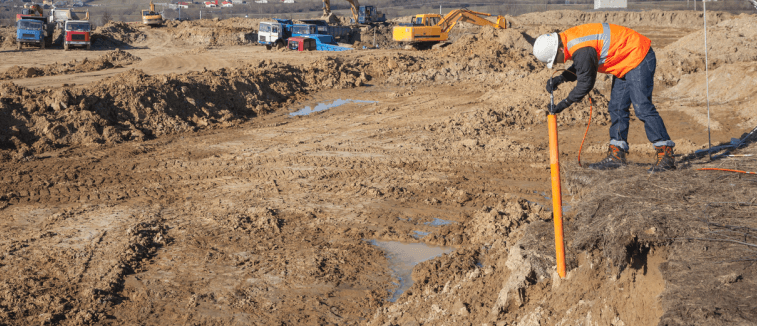Rumored Buzz on Geotheta

A geotechnical designer is a specialized civil engineer that focuses on the actions of dirt, rock, and other materials discovered underneath the Earth's surface area. They apply scientific concepts and engineering techniques to analyze the buildings and habits of these products to support the risk-free and efficient design, building, and upkeep of infrastructure projects.
They carry out site examinations, gather samples, carry out research laboratory tests, and examine data to evaluate the viability of the ground for construction tasks - Geotechnical Engineers. Based upon their searchings for, geotechnical engineers supply referrals for foundation style, incline stability, preserving structures, and reduction of geotechnical threats. They work together with various other professionals, such as engineers, structural engineers, and building and construction groups, to make certain that geotechnical factors to consider are integrated right into the total task design and implementation
By analyzing the actions and residential or commercial properties of soil and rock, they can recognize possible geotechnical hazards such as landslides, dirt settlement, or slope instability. Their proficiency helps avoid failures or accidents that could threaten lives and residential property. Below are some detailed responsibilities and duties of a geotechnical designer: Website Investigation: Geotechnical engineers conduct website investigations to gather information on subsurface problems.
They interpret the information to understand the homes and behavior of the dirt and rock, including their stamina, leaks in the structure, compaction qualities, and groundwater problems. Geotechnical Evaluation and Style: Geotechnical engineers evaluate the information accumulated during website investigations to analyze the security and suitability of the website for building projects. They perform geotechnical calculations and modeling to assess variables such as birthing ability, negotiation, slope stability, side planet stress, and groundwater flow.
What Does Geotheta Do?
Foundation Style: Geotechnical designers play an important role in making structures that can securely sustain the intended structure. They examine the soil problems and lots demands to identify the ideal structure type, such as superficial structures (e.g., grounds), deep foundations (e.g (https://soundcloud.com/geotheta)., heaps), or specialized techniques like dirt enhancement. They take into consideration variables such as settlement limitations, bearing capacity, and soil-structure interaction to create optimal foundation designs
They review building strategies, screen website activities, and carry out field examinations to confirm that the style referrals are adhered to. If unpredicted geotechnical issues occur, they analyze the scenario and provide recommendations for remediation or changes to the layout. Risk Evaluation and Reduction: Geotechnical designers analyze geotechnical risks and dangers connected with the task website, such as landslides, liquefaction, or dirt disintegration.

Collaboration and Communication: Geotechnical designers function carefully with other professionals associated with a project, such as designers, structural engineers, and building groups. Efficient interaction and partnership are vital to integrate geotechnical factors to consider right into the overall project style and construction procedure. Geotechnical engineers provide technological know-how, answer questions, and guarantee that geotechnical demands are satisfied.
Some Known Facts About Geotheta.
Right here are some kinds of geotechnical designers: Foundation Engineer: Foundation engineers specialize in making and evaluating foundations for frameworks. They analyze the dirt problems, load requirements, and site characteristics to figure out the most proper structure kind and design, such as superficial structures, deep foundations, or specialized strategies like heap structures.
They examine the aspects influencing slope stability, such as dirt homes, groundwater conditions, and slope geometry, and establish strategies to avoid slope failures and minimize dangers. Quake Designer: Quake engineers concentrate on examining and developing frameworks to withstand seismic forces. They examine the seismic danger of a website, review dirt liquefaction possibility, and create seismic style standards to make sure the safety and security and durability of frameworks during earthquakes.
They carry out field testing, collect examples, and examine the gathered information to define the soil residential properties, geologic developments, and groundwater conditions at a site. Geotechnical Instrumentation Designer: Geotechnical instrumentation designers focus on tracking and measuring the habits of dirt, rock, and structures. They mount and keep instrumentation systems that keep track of elements such as soil negotiation, groundwater levels, slope activities, and architectural variations to evaluate efficiency and give very early warnings of potential issues.
The 9-Second Trick For Geotheta
They have a tendency to be investigatory individuals, which suggests they're intellectual, reflective, and inquisitive. They are interested, systematic, reasonable, analytical, and sensible. Some of them are likewise social, suggesting they're kind, charitable, cooperative, individual, caring, practical, empathetic, tactful, and friendly - Consulting Engineer.
In the workplace environment, geotechnical engineers make use of specialized software devices to do calculations, develop designs, and assess data. They prepare records, evaluation job requirements, connect with customers and team participants, and coordinate job tasks. The workplace setting gives a conducive environment for research, analysis, and collaboration with various other experts entailed in the job.
4 Simple Techniques For Geotheta
They regularly check out project sites to perform website examinations, examine geotechnical conditions, and gather information for analysis. These sees involve traveling to different locations, occasionally in remote or difficult surfaces. Geotechnical engineers may do dirt tasting, conduct examinations, and display construction activities to ensure that the geotechnical aspects of the job are being executed properly.
Geotechnical designers likewise work in specialized geotechnical laboratories. Geotechnical research laboratory designers function thoroughly in these atmospheres, handling screening equipment, operating tools, and videotaping data.
Comments on “Fascination About Geotheta”